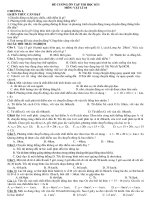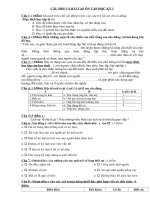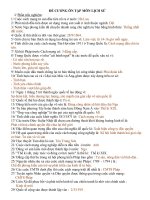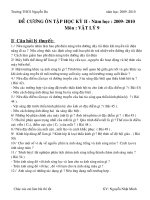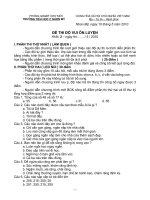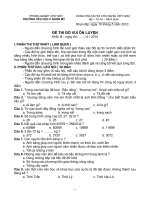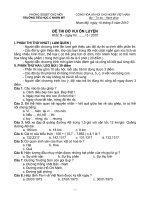- Trang chủ >>
- THPT Quốc Gia >>
- Lịch sử
Đề cương ôn tập thi học kỳ I chương trình đào tạo quốc tế - Tiếng anh 6
Bạn đang xem bản rút gọn của tài liệu. Xem và tải ngay bản đầy đủ của tài liệu tại đây (2.71 MB, 46 trang )
<span class='text_page_counter'>(1)</span><div class='page_container' data-page=1>
<b>Unit 1 – My new school</b>
<b>Part A – Vocabulary and Grammar</b>
<b>I/ Match the words with the pictures.</b>
1. computer
2. post office
3. school
4. volleyball
5. book
<b>II/ Put the verbs in brackets in the correct tense form.</b>
1. School (finish) at 4.30 p.m every day.
2. Where you (be) , Phong?
I’m upstairs. I (do) my homework.
3. It’s warm today. I (not want) (stay) at home now.
4. What about (go) swimming in the river?
</div>
<span class='text_page_counter'>(2)</span><div class='page_container' data-page=2>
A. cooking
B. writing
C. standing
D. talking
(1)
A. physical exercise
B. computer studies
C. physics experiment
D. English practice
(2)
A. dinner time
B. maths things
C. playing field
D. break time
(3)
A. kitchen things
B. school things
C. pens and pencils
D. e-books
(4)
<b>IV/ Ask and answer questions using the given words.</b>
1. grandfather/ read newspapers
...
...
2. boys/ play football
...
...
</div>
<span class='text_page_counter'>(3)</span><div class='page_container' data-page=3>
4. she/ usually/ cook dinner/ five p.m.
...
...
5. Mai/ watch TV
</div>
<span class='text_page_counter'>(4)</span><div class='page_container' data-page=4>
<b>Unit 1 – My new school</b>
<b>Part B – Listening</b>
<b>I/ Match the words with the school things. Then listen and repeat.</b>
1. bicycle 1 -
2. notebook 2
-3. pencil sharpener 3
-4. ruler 4
-5. calculator 5
-6. textbook 6
-7. rubber 7
-8. workbook 8
-9. compass 9
-10. schoolbag 10
<b>-II/ Mela is a student at Vinabrita School. Listen and choose the correct answers.</b>
1. Mela being at a international school.
A. likes B. doesn’t like
</div>
<span class='text_page_counter'>(5)</span><div class='page_container' data-page=5>
4. Mela studies for three hours a month.
A. EL B. AL
5. Mela is doing her homework now.
</div>
<span class='text_page_counter'>(6)</span><div class='page_container' data-page=6>
<b>Unit 1 – My new school</b>
<b>Part C – Reading</b>
<b>I/ Put an appropriate word from the box in each gap to complete the following passage.</b>
their on begins go off school all learn
<i>In England, when the schoolchildren come to school, they first (1) to the cloakroom.</i>
<i>They take (2) their coats and raincoats, their caps and hats, and then go to (3) </i>
<i> classroom. Some of the students go to the laboratories and workshops where they (4) </i>
<i> physics, chemistry and art. When a student is (5) duty, he comes to (6) </i>
<i> very early. He has to open (7) the windows, water the flowers and clean the </i>
<i>blackboard so everything is ready for the first lesson. At seven thirty, the teacher comes into the room and </i>
<i>the lesson (8) .</i>
<b>II/ Read the conversation and answer the questions.</b>
<i><b>Mr Green:</b></i> <i>Hey, Tom. How’s your first week at the new school.</i>
<i><b>Tom:</b></i> <i>Well, it’s great. But I was a bit nervous at first.</i>
<i><b>Mr Green:</b></i> <i>Why were you nervous?</i>
<i><b>Tom:</b></i> <i>The teachers are all new to me, most of my classmates are new too.</i>
<i><b>Mr Green:</b></i> <i>Are they friendly to you?</i>
<i><b>Tom:</b></i> <i>Ah, yeah. They are all nice to me.</i>
<i><b>Mr Green:</b></i> <i>What subjects did you have today?</i>
<i><b>Tom:</b></i> <i>Well, we had maths, geography and computer studies, my favourite subject.</i>
<i><b>Mr Green:</b></i> <i>Oh, good. So everything is going well at school?</i>
<i><b>Tom:</b></i> <i>Right. I had a good first day. And ... Dad, can I join the judo club at school? I like to do </i>
<i>judo.</i>
<i><b>Mr Green:</b></i> <i>Yeah, OK, if you like. But don’t forget to do your homework.</i>
<i><b>Tom:</b></i> <i>I won’t. Thanks, Dad.</i>
1. Why was Tom nervous at first?
...
2. What is his favourite subject?
...
3. Is Tom having a nice first week at his new school?
</div>
<span class='text_page_counter'>(7)</span><div class='page_container' data-page=7>
5. What club does he want to join?
</div>
<span class='text_page_counter'>(8)</span><div class='page_container' data-page=8>
<b>III/ Choose the correct word A, B or C for each of the gaps to complete the following text.</b>
<i>What do you do if you want to (1) ... a book in a </i>
<i>library? If you know the author’s (2) ..., go to the </i>
<i>author catalouge. Find the title of the book (3) ... </i>
<i>check the shelf mark. Make a note of this before you look </i>
<i>(4) ... the appropriate shelf. If you do not know the </i>
<i>author’s name, go to the (5) ... catalogue. If there </i>
<i>(6) ... no title catalogue in the library, go to the </i>
<i>subject catalogue. Check all the titles which are under the </i>
<i>(7) ... you want. Then check the appropriate card, as </i>
<i>with the author catalogue. Next look for the book on the </i>
<i>shelf. Let the librarian stamp it (8) ... you take it out </i>
<i>of the library. If the book isn’t on the shelf, ask the </i>
<i>librarian to get it for you.</i>
1. A. find B. look C. take
2. A. address B. title C. name
3. A. and B. or C. but
4. A. at B. for C. after
5. A. title B. author C. subject
6. A. be B. are C. is
7. A. subject B. book C. index
</div>
<span class='text_page_counter'>(9)</span><div class='page_container' data-page=9>
<b>Unit 1 – My new school</b>
<b>Part D – Writing</b>
<b>I/ Make sentences using the words and phrases given.</b>
1. computer studies/ Trong’s favourite subject/.
2. Mrs Hoa/ our teacher/ English/.
3. There/ six coloured pencils/ my friend’s box/.
4. Where/ Ms Lan/ live/?
5. Shall/ introduce you/ my best friend, An Son/?
<b>II/ Write the correct versions of these sentences.</b>
1. school starts on the 5th<sub> september</sub>
2. does he live in ha noi
3. im excited about the first day at school
4. are you doing your homework
5. were having an english lesson in class
<b>III/ Write the correct version of the passage.</b>
<i>hi im phong and im from ho chi minh city i wear my uniform to school every day my favourite teacher</i>
<i>is mr trung he teaches me science</i>
</div>
<span class='text_page_counter'>(10)</span><div class='page_container' data-page=10>
<b>Unit 2 – My home</b>
<b>Part A – Vocabulary and Grammar</b>
<b>I/ Fill each blank with a suitable word.</b>
1. I live a ... house in Ho Chi Minh City.
2. K’nia lives with her family in a ... house in Tay Nguyen.
3. Last year, Lan lived with her family in a big ... house in Hung
Yen.
</div>
<span class='text_page_counter'>(11)</span><div class='page_container' data-page=11>
5. I want to live in a ... with a big garden.
<b>II/ Find which word does not belong in each group. Then read the words aloud.</b>
1. A. sofa B. chair C. toilet D. table
2. A. cooker B. desk C. dishwasher D. fridge
3. A. bed B. lamp C. fan D. villa
4. A. aunt B. uncle C. grandmother D. teacher
5. A. cousin B. mother C. father D. brother
<b>III/ Look at the picture below. Then guess the right word.</b>
1/
2/
3/
</div>
<span class='text_page_counter'>(12)</span><div class='page_container' data-page=12></div>
<span class='text_page_counter'>(13)</span><div class='page_container' data-page=13>
<b>Unit 2 – My home</b>
<b>Part B – Listening</b>
<b>I/ Listen and complete the passage.</b>
<i>The living room in my house is big. There (1) a table and a sofa. There </i>
<i>(2) also two armchairs. There (3) a ceiling lamp, but there </i>
<i>(4) two standing lamps. The room is cool in the summer because there </i>
<i>(5) a ceiling fan and an air-conditioner. There (6) many pictures on the </i>
<i>wall ; there (7) only one big picture. What I like best in the room is the big window.</i>
<b>II/ Listen and fill each blank in the following conversations.</b>
<i><b>Mum:</b></i> <i>Do you know where our cat is?</i>
<i><b>Mi:</b></i> <i>I think it’s (1) ... the dining table (2) ... the kitchen.</i>
<i><b>Mum:</b></i> <i>Do you see my book anywhere, sweetie?</i>
<i><b>Mi:</b></i> <i>Yes, Mum. It’s (3) ... the table. I saw it this morning.</i>
<i><b>Mum:</b></i> <i>Thanks, sweetie. Oh, I have to find my hat.</i>
<i><b>Mum:</b></i> <i>It’s here. It’s (4) ... your book. Do you need your book now?</i>
<i><b>Mi:</b></i> <i>Yes, Mum. Thank you.</i>
<i><b>Dad (from the living room):</b></i> <i>Honey, do you see my reading glasses on the dining table?</i>
<i><b>Mum:</b></i> <i>Yes, honey. They are (5) ... Mi’s book and the vase.</i>
<b>III*/ Listen and complete the following online conversation between Mi and Nick.</b>
<i><b>Nick:</b></i> <i>Mi, are you in your room?</i>
<i><b>Mi:</b></i> <i>... (1)</i>
<i><b>Nick:</b></i> <i>I can see some posters on the wall. Do you like posters?</i>
<i><b>Mi:</b></i> <i>... (2)</i>
<i><b>Nick:</b></i> <i>Yes, I do. But my parents don’t like them. Is there a TV in your room?</i>
<i><b>Mi:</b></i> <i>... (3)</i>
<i><b>Nick:</b></i> <i>Me too. We usually watch TV together in the living room. I can’t see the bed. Is there a bed </i>
<i>in your room?</i>
<i><b>Mi:</b></i> <i>... (4)</i>
<i><b>Nick:</b></i> <i>Yes. It’s also next to my bed. Do you like your room?</i>
<i><b>Mi:</b></i> <i>... (5)</i>
<b>IV/ Listen and answer the questions.</b>
1/ Is Tom’s bedroom big or small?
</div>
<span class='text_page_counter'>(14)</span><div class='page_container' data-page=14>
2/ What is there in Vy’s bedroom?
3/ What is there in Tom’s bedroom?
</div>
<span class='text_page_counter'>(15)</span><div class='page_container' data-page=15>
<b>Unit 2 – My home</b>
<b>Part C – Reading</b>
<b>I/ Fill each blank in the following passage with a suitable word from the box.</b>
untidy are not near next on his bag
<i>An’s bedroom is big but messy. There (1) clothes on the floor. There is a big desk (2) </i>
<i> the window, and there are dirty bowls and chopsticks (3) it. He usually puts his </i>
<i>(4) under the desk. His bed is (4) under the desk. His bed is </i>
<i>(5) to the desk, and it is also (6) . There is a cap, some CDs and some books </i>
<i>on the bed. An’s mum is (7) happy with this, and now An is tidying up </i>
<i>(8) room.</i>
<b>II/ Choose the correct word A, B or C to fill each blank in the following conversation.</b>
<i><b>Mum:</b></i> <i>We are moving to the new apartment next month. Do you want a new bed?</i>
<i><b>Mi:</b></i> <i>No, I don’t, Mum. I (1) ... my old bed. It’s so comfortable. But can I (2) ... a new </i>
<i>poster?</i>
<i><b>Mum:</b></i> <i>You have three posters already. You can put them (3) ... the wall in your new room.</i>
<i><b>Mi:</b></i> <i>Yes, Mum. I want to have a family photo on my desk. There (4) ... only a lamp on it now.</i>
<i><b>Mum:</b></i> <i>That’s a good idea. Oh, where do you want to put your desk?</i>
<i><b>Mi:</b></i> <i>(5) ... to my bed, Mum. I also want a small plant in my room.</i>
<i><b>Mum:</b></i> <i>That’s fine. It can go (6) ………… the bookshelf and the desk.</i>
1. A. hate B. love C. dislike
2. A. sell B. buy C. give
3. A. in B. near C. on
4. A. is B. are C. isn’t
5. A. Near B. Behind C. Next
</div>
<span class='text_page_counter'>(16)</span><div class='page_container' data-page=16>
<b>Unit 2 – My home</b>
<b>Part D – Writing</b>
<b>I/ Complete each sentence so it means the same as the sentence above.</b>
1. I don’t have a bookshelf in my bedroom.
There .
2. We have a sink, a fridge, a cooker and a cupboard in our kitchen.
There .
3. The notebook is on the book.
The book .
4. The dog is in front of the microwave.
The microwave .
5. My favourite room in the house is the living room.
In the house, I like .
<b>II/ Can you check the middle of the e-mail? Write the correct version.</b>
hi sophia
</div>
<span class='text_page_counter'>(17)</span><div class='page_container' data-page=17>
<b>Unit 3 – My friends</b>
<b>Part A – Vocabulary and Grammar</b>
<b>I. Decide if the present continuous expresses (a) an activity happening now or (b) a planned future </b>
<b>arrangement.</b>
<i><b>a</b></i> <i><b>b</b></i>
1. What time are your friends coming for the party tonight? ... ...
2. Could you call back? She’s taking her dog out for a walk. ... ...
3. Where’s Mai? – She’s helping Mum in the kitchen. ... ...
4. What are you doing after school? ... ...
5. Listen! Someone is knocking at the door. ... ...
6. We are going to the zoo this weekend. Would you like to join us? ... ...
<b>II. Use these words to write sentences. Use the present continuous. How do you know they express </b>
<b>future plans or arrangements?</b>
1. Our grandparents – visit – next month.
2. Thu – not – come – party – on Wednesday.
3. My sister – get married – this December.
4. Sorry, I can’t stay after school today ; I – play – football with Phong.
5. My mother – go – the dentist – tomorrow.
</div>
<span class='text_page_counter'>(18)</span><div class='page_container' data-page=18>
<b>Unit 3 – My friends</b>
<b>Part B – Listening</b>
<b>I. You will hear a conversation between reporter and Chi. Listen and answer these questions.</b>
1. What is Chi doing after her lessons?
2. Where is Chi going after school today?
3. What is Chi doing tomorrow?
<b>II. What do you see in the photos? Listen and write these words.</b>
... ... ...
</div>
<span class='text_page_counter'>(19)</span><div class='page_container' data-page=19></div>
<span class='text_page_counter'>(20)</span><div class='page_container' data-page=20>
<b>Unit 3 – My friends</b>
<b>Part C – Reading</b>
<b>I/ Read the interview between 4Teen magazine reporter and Miss Hong, a teacher, about how to being</b>
<b>a good friend. Then do as dicreted.</b>
<i><b>Reporter:</b></i> <i>So, Miss Hong, what are the qualities of a good friend do you think?</i>
<i><b>Miss Hong:</b></i> <i>I think good friends are reliable. They never lie to you. They always listen to you. And </i>
<i>they help you. They’re always there when you need them, in good or bad times.</i>
<i><b>Reporter:</b></i> <i>But do we have to be similar?</i>
<i><b>Miss Hong:</b></i> <i>Not necessarily. It’s best if friends have similar interests, you know, like listening to pop </i>
<i>music or playing basketball, but we also respect the differences in others.</i>
<i><b>Reporter:</b></i> <i>Definitely. By the way, what do you often do with your friends?</i>
<i><b>Miss Hong:</b></i> <i>Oh... we do lots of things, like biking, swimming, ... and of course shopping!</i>
<b>a/ What does she think a good friend should do? Circle the correct answers.</b>
A. A good friend listens to you.
B. A good friend sometimes lies to you.
C. A good friend helps you.
D. A good friend always likes the same things as you.
E. A good friend shares happy and sad times with you.
<b>b/ Do you agree with Miss Hong? What do you think a good friend should do?</b>
...
...
...
<b>II/ Phuc is writing his entry to “Your best friend” competition. Read his entry. Then decide if the </b>
<b>statements are True (T) or False (F).</b>
</div>
<span class='text_page_counter'>(21)</span><div class='page_container' data-page=21>
<i>Museum to take some photos for our project. Then we’re watching a new film on the Disney channel </i>
<i>together. It’s going to be fun!</i>
<b>T</b> <b>F</b>
1. Phuc and Mai are studying in the same school. ... ...
2. Mai has long black hair and big eyes. ... ...
3. She is clever, hard-working, and funny. ... ...
4. She likes writing short stories. ... ...
</div>
<span class='text_page_counter'>(22)</span><div class='page_container' data-page=22>
<b>Unit 3 – My friends</b>
<b>Part D – Writing</b>
<b>Write a long paragraph (10 – 20 sentences) about your best friend. Use your own ideas and the </b>
<b>passage in Part C – Reading – II ideas.</b>
</div>
<span class='text_page_counter'>(23)</span><div class='page_container' data-page=23>
<b>Unit 4 – My neighbourhood</b>
<b>Part A – Vocabulary and Grammar</b>
<b>I/ Fine one odd word A, B, C, or D.</b>
1. A. grocery B. restaurant C. café D. cathedral
2. A. better B. smaller C. worker D. hotter
3. A. sweet B. bread C. cake D. coffee
4. A. baker B. grocer C. neighbour D. barber
5. A. factory B. park C. theatre D. cinema
<b>II/ Write sentences, using the comparative form of the adjectives.</b>
1. Mai/ intelligent/ Kien/ .
2. My brother/ strong/ my sister/ .
3. My school/ big/ my brother’s school/ .
4. Life in the city/ exciting/ life in the countryside/ .
5. Peter’s exam results/ bad/ Nick’s exam results/ .
<b>III/ Complete the sentences with the correct comparative form of the adjectives.</b>
1. It’s (cold) in the north of Viet Nam than in the south.
2. Is a snake (dangerous) than a dog?
3. Doing our homework is (important) than reading a novel.
4. She’s not very happy. Her exam (bad) than her sister’s.
5. Let’s go to Da Lat. The weather’s (good) there than that in Ho Chi Minh City.
<b>IV*/ Complete the sentences with the phrases in the box to make comparisons.</b>
she was a child than it was when I
</div>
<span class='text_page_counter'>(24)</span><div class='page_container' data-page=24>
2. My watch is much older .
3. She is more attractive than when .
4. I’m happier in my new school .
5. Fewer people own a bicycle now .
</div>
<span class='text_page_counter'>(25)</span><div class='page_container' data-page=25>
<b>Unit 4 – My neighbourhood</b>
<b>Part B – Listening</b>
<b>I/ Listen and complete the following dialogues.</b>
1. A: Can you tell me the way to the post office?
B: .
2. A: ?
B: Yes, there is one on Nguyen Du Street. First go straight, then turn left. It’s on your right.
3. A: Excuse me, is there a bank near here?
B: .
4. A: ?
B: First take the second turning on your left. Then keep straight. It’s on your left.
5. A: Where can we see a film in this neighbourhood?
B: .
6. A: ?
B: There’s an Internet café on Le Loi Street. First go past the traffic lights, and then turn left. Go to
the end of the street. It’s on your right.
<b>II/ Listen and complete the letter.</b>
<i>Dear Ha,</i>
<i>Let’s (1) on Sunday evening at Quynh Caféon Tran Quang Dieu Street. There’s a </i>
<i>post office on the corner of the street. The café is next to the post office. There’s a cinema opposite </i>
<i>the café (2) we can see a film after we have coffee.</i>
<i>To (3) to the café, take bus (4) 8 to Truong Thi Street. Get off at the </i>
<i>bus stop in front of a park. Go along the street (5) you get to the traffic lights and </i>
<i>then turn right. Take the first (6) on your right. Go straight ahead – just about 500 </i>
<i>metres and it’s on your left.</i>
</div>
<span class='text_page_counter'>(26)</span><div class='page_container' data-page=26>
<b>Unit 4 – My neighbourhood</b>
<b>Part C – Reading</b>
<b>I/ Choose the correct answer A, B, C, or D for each of the gaps to complete the following text.</b>
<b>OAK CITY</b>
<i>Oak City is a great city. There’s so (1) to do! There are cinemas, parks and discos. </i>
<i>It’s got some great clothes and music shops (2) .</i>
<i>Oak City is very modern and beautiful. There aren’t any (3) buildings and there’s </i>
<i>some beautiful (4) around the city.</i>
<i>Is there any pollution in the Oak City? There isn’t much pollution (5) there isn’t </i>
<i>much traffic. Everyone travels (6) bike and walks, so there aren’t many accidents.</i>
<i>No one works, so everyone has got a lot of free time. Are there any unfriendly people in Oak City? </i>
<i>No – so come and spend a little time here!</i>
1. A. much B. many C. some D. any
2. A. neither B. either C. too D. so
3. A. beautiful B. ugly C. pretty D. unpleasant
4. A. scenery B. scene C. view D. sight
5. A. so B. because C. although D. if
6. A. on B. in C. with D. by
<b>II/ Read the email and answer the following questions.</b>
<i>Dear Phong,</i>
<i>I’m sorry I couldn’t write to you earlier because I was very busy. Now, we’re staying in a hotel near </i>
<i>a shopping area in District 10. Near my hotel, there’s a cinema, a post office, a supermarket and some </i>
<i>cafés. There are some big shops at the end of the street. It is also very noisy here because there’s always a </i>
<i>lot of traffic, day and night.</i>
</div>
<span class='text_page_counter'>(27)</span><div class='page_container' data-page=27>
1. Where is Nam staying now?
2. Why is it very noisy around his hotel?
3. What are the streets in his neighbourhood like?
4. Is there a park in his neighbourhood?
5. What are the houses in his neighbourhood like?
</div>
<span class='text_page_counter'>(28)</span><div class='page_container' data-page=28>
<b>Unit 4 – My neighbourhood</b>
<b>Part D – Writing</b>
<b>I/ Rewrite the sentences using the words in brackets. Do not change the meaning of the sentences and </b>
<b>do not change the form of the verbs.</b>
1. Quang is lazier than Ha.
2. A city is noisier than a village.
3. There’s a post office on one side of my house and a café on the other.
4. Please tell me something about your neighbourhood.
5. Oranges are cheaper than apples.
<b>II/ Write a paragraph about your neighbourhood (about 100 words).</b>
</div>
<span class='text_page_counter'>(29)</span><div class='page_container' data-page=29>
<b>Unit 5 – Natural wonders of the world</b>
<b>Part A – Vocabulary and Grammar</b>
<b>I/ Find one odd word A, B, C, or D.</b>
1. A. island B. mountain C. bay D. building
2. A. long B. deep C. wonderful D. high
3. A. rock B. waterfall C. river D. lake
4. A. watch B. see C. enjoy D. look
5. A. biggest B. quieter C. best D. smallest
<b>II/ Fill the blanks with the appropriate forms of the adjectives in brackets.</b>
1. Bangladesh is the (wet) of the three countries: Viet Nam, England and Bangladesh.
2. The Sahara is the world’s (hot) desert.
3. Loch Lomond in Scotland is the (large) freshwater lake in Great Britain.
4. Lake Erie is (small) than Lake Huron.
5. Mount Everest is 8,848 metres (high) .
6. The Amazon River is (long) than the Mekong River.
7. Fansipan is the (high) mountain in Viet Nam.
8. Travelling by bus is (cheap) than by taxi.
<b>III/ Compare these places using the comparative and superlative forms of the adjective: large.</b>
1. Russia is ... than the USA.
-Australia-2. The USA is ... than Australia.
</div>
<span class='text_page_counter'>(30)</span><div class='page_container' data-page=30>
USA-3. Russia is ... of the three countries.
<b>-Russia-IV/ Match the words in A with their meaning in B.</b>
<b>A</b> <b>B</b>
1. thread a) poems, verse
2. jungle b) fall hard
3. tumble c) a string made of thin bits of cotton, wool, etc.
4. poetry d) many small bubbles
5. marvelous e) shine brightly with small flashes of light
6. foam f) surprising and wonderful
</div>
<span class='text_page_counter'>(31)</span><div class='page_container' data-page=31>
<b>Unit 5 – Natural wonders of the world</b>
<b>Part B – Listening</b>
<b>Listen and choose the correct words.</b>
1. A strong gust/ gut of wind often blows down trees on the top of the mountain.
2. Doi Cave in Ca Mau is famous for a very special species of bat/ bast.
3. A lion is regarded as a dangerous beat/ beast in African jungles.
4. In some tourist places, the cost/ cot of souvenirs is very high.
5. He was bored after a boat trip along the coat/ coast.
</div>
<span class='text_page_counter'>(32)</span><div class='page_container' data-page=32>
<b>Unit 5 – Natural wonders of the world</b>
<b>Part C – Reading</b>
<b>I/ Read the article about Angel Falls and answer the following questions.</b>
<i><b>ANGEL FALLS</b></i>
<i>Angel Falls is the highest waterfall in the world. It is located in the </i>
<i>lonely jungles of Venezuela. The best way to get to the falls is by air.</i>
<i>From the top to the bottom, the waterfall is 3,212 feet, over 1,000 feet </i>
<i>higher than any other falls in the world. It looks like a silver thread </i>
<i>hanging from the clouds. Visitors can see spectacular scenery at the </i>
<i>falls. Water drops straight down the cliff and tumbles and foams over the</i>
<i>lower canyon wall. The fine spray catches the light and sparkles in the </i>
<i>sun.</i>
<i>The falls were named after Jimmie Angel. He was a pilot and he </i>
<i>discovered the falls in 1937. However, the local people already knew it </i>
<i>and called it Churún Merú.</i>
1. What is Angel Falls?
2. Where is it?
3. How high are the falls from the top to the bottom?
4. Why were the falls named Angel Falls?
5. When did Jimmie Angel discover the falls?
<b>II/ Read about Da Nang City and answer the questions.</b>
</div>
<span class='text_page_counter'>(33)</span><div class='page_container' data-page=33>
<i>Da Nang has a population of nearly 800,000 people. The Han River </i>
<i>flows through the city. The city part on the east bank is newer and more </i>
<i>spacious. The city part on the west bank is more crowded. There are five </i>
<i>bridges across the river. The Han River Bridge is the newest one now.</i>
<i>The cost of living in Da Nang is the lowest in Central Viet Nam. Da </i>
<i>Nang has many beaches. Among them, Non Nuoc Beach is one of the </i>
<i>most beautiful beaches in the world. But walking in the streets on a </i>
<i>summer afternoon is not a good idea in Da Nang. There are not many </i>
<i>trees so there are not many shadows. It is often very hot at noon.</i>
1. What is the population of Da Nang?
2. Which part of the city is more spacious?
3. Which part of the city is more crowded?
4. Which bridge is the newest in Da Nang?
5. What is Non Nuoc Beach like?
</div>
<span class='text_page_counter'>(34)</span><div class='page_container' data-page=34>
<b>Unit 5 – Natural wonders of the world</b>
<b>Part D– Writing</b>
<b>I/ Use the following sets of words and phrases to write complete sentences.</b>
1. The Truong Sa Islands/ large/ The Hoang Sa Islands/.
2. Ayers Rock/ strange/ rock/ Australia/ .
3. Which/ high/ Fansipan/ or/ Mount Everest/ ?
4. I think/ Phong Nha – Ke Bang National Park/ as/ wonderful/ Cat Tien National Park/ .
5. Ha Long Bay/ famous/ Phu Quoc Island/ .
<b>II/ Rewrite the following sentences, beginning as shown, so that the meaning stays the same.</b>
1. Shanghai World Financial Centre is higher than Keangnam Tower.
Keangnam Tower is .
2. In summer, Da Nang is hot but Vinh is hotter.
In summer, Vinh is .
3. It is wrong of us to throw rubbish.
We mustn’t .
4. It is necessary for us to be present at the class discussion on Saturday.
We must .
5. Ha Noi is large, Bangkok is larger and Tokyo is the largest.
</div>
<span class='text_page_counter'>(35)</span><div class='page_container' data-page=35>
<b>Unit 6 – Our Tet Holiday</b>
<b>Part A – Vocabulary and Grammar</b>
<b>I/ Find the word which has a different sound in the part underlined.</b>
1. A. cook B. clean C. celebrate D. candy
2. A. April B. decorate C. make D. tradition
3. A. every B. prepare C. relative D. helping
4. A. spring B. visit C. present D. season
5. A. chat B. peach C. chocolate D. chemistry
<b>II/ A friend invites you to have lunch with his family at Tet. Complete the sentences with should or </b>
<i><b>shouldn’t.</b></i>
1. I with him “Happy New Year”.
2. I ask his mother for lucky money.
3. I wait for the elders to start the meal.
4. I help my friend to clear the table after the meal.
5. I eat with my hands.
6. I make noise when I am eating.
7. I say “Thank you” when I leave.
<b>III/ Choose the correct answer A, B, C, or D to complete the sentences.</b>
1. Viet Nam Tet, but Korea doesn’t.
A. decorates B. celebrates C. makes D. does
2. Would your sister like to the party?
A. to go B. going C. go D. goes
3. homework do you usually get after each class every day?
A. How many B. Is there C. Are there D. How much
4. I always for a long and happy life for my parents.
A. make B. wish C. celebrate D. have
5. My father is coming home for Tet. We a very happy time.
A. will to have B. don’t having C. don’t have D. will have
6. It’s raining heavily outside, so we go out.
</div>
<span class='text_page_counter'>(36)</span><div class='page_container' data-page=36></div>
<span class='text_page_counter'>(37)</span><div class='page_container' data-page=37>
<b>Unit 6 – Our Tet Holiday</b>
<b>Part B – Listening</b>
<b>I/ Listen and repeat these sentences. Notice the underlined words.</b>
1. The policeman showed me the way to the centre.
2. Do you have peach blossoms during summer?
3. Children shouldn’t eat too much ice-cream.
4. Most countries celebrate the New Year.
5. When Tet comes, everybody makes a wish.
<b>II*/ Listen and complete a conversation.</b>
<i><b>Phong:</b></i> <i>Happy New Year, Grandpa. (1) ...</i>
<i><b>Grandpa:</b></i> <i>Happy New Year, Phong. (2) ...</i>
<i><b>Phong:</b></i> <i>Thank you, Grandpa. And Dad, (3) ...</i>
<i><b>Dad:</b></i> <i>Thank you, son. (4) ...</i>
<i><b>Phong:</b></i> <i>Thanks Dad. I will.</i>
</div>
<span class='text_page_counter'>(38)</span><div class='page_container' data-page=38>
<b>Unit 6 – Our Tet Holiday</b>
<b>Part C – Reading</b>
<b>Read the passages about strange New Year practices in some countries. Then do as direction.</b>
Denmark – Many Danish people have a very loud
traditional way of celebrating the New Year. They
throw plates at their friends’ doors. The people with
many dishes outside their doors feel proud because
they have a lot of friends.
The USA – It’s a tradition in America to share a
midnight kiss with someone you love. This will
make the coming year beautiful for you. They
believe this practice will brng you a New Year full of
love and life.
Korea – The celebration is mostly for young
children. They wear a “Hanbok”, a traditional
Korean dress, make one bow to their grandparents or
elders and wish them a long and healthy life. In
return they receive words of advice and some
money.
<b>I/ Decide if the statements are True (T) or False (F).</b>
<b>When the New Year comes, ...</b> <b>True False</b>
1. The American exchange a midnight kiss with someone they love.
2. Korean elders bow to their children.
3. Korean children make three bows to their elders.
4. The Danish way of celebrating the New Year is quiet.
<b>II/ Complete the sentences with the words given.</b>
midnight kiss children break Hanbok
1. A will bring a New Year full of love.
2. The Danish plates on friends’ doors at New Year.
3. Korean children wear a at the New Year.
</div>
<span class='text_page_counter'>(39)</span><div class='page_container' data-page=39>
<b>Unit 6 – Our Tet Holiday</b>
<b>Part D – Writing</b>
<b>I/ Rewrite the following sentences in a way that their original meanings do not change.</b>
1. It’s good if children go to bed early.
Children should .
2. It’s not a good idea when students copy other students’ work.
Students shouldn’t .
3. I am not happy when children lie to their parents.
Children shouldn’t .
4. It’s good if you say “Thank you” to a person who has helped you.
You should .
<b>II*/ Write true sentences about New Year practices in different countries, using the words/ phrases </b>
<b>given.</b>
1. the Scottish/ go/ graveyard/ on New Year’s Eve/ .
2. Viet Nam/ people/ should/ break things/ at Tet/ .
3. Japan/ temples/ ring/ their bells/ 108 times/ .
4. a midnight kiss/ can/ bring/ a lot of money/ .
5. Thai people/ throw/ water/ one another/ .
6. Danish people/ decorate/ houses/ drawing of the Sun/ .
</div>
<span class='text_page_counter'>(40)</span><div class='page_container' data-page=40>
<b>Review 1st<sub> semester test</sub></b>
<b>Part I:</b>
<b>I/ Match the words with the pictures.</b>
1. computer
2. post office
3. school
4. volleyball
5. book
<b>II/ You will hear a conversation between reporter and Chi. Listen and answer these questions.</b>
1. What is Chi doing after her lessons?
2. Where is Chi going after school today?
3. What is Chi doing tomorrow?
</div>
<span class='text_page_counter'>(41)</span><div class='page_container' data-page=41>
<b>III/ Read the article about Angel Falls and answer the following questions.</b>
<i><b>ANGEL FALLS</b></i>
<i>Angel Falls is the highest waterfall in the world. It is located in the </i>
<i>lonely jungles of Venezuela. The best way to get to the falls is by air.</i>
<i>From the top to the bottom, the waterfall is 3,212 feet, over 1,000 feet </i>
<i>higher than any other falls in the world. It looks like a silver thread </i>
<i>hanging from the clouds. Visitors can see spectacular scenery at the </i>
<i>falls. Water drops straight down the cliff and tumbles and foams over the</i>
<i>lower canyon wall. The fine spray catches the light and sparkles in the </i>
<i>sun.</i>
<i>The falls were named after Jimmie Angel. He was a pilot and he </i>
<i>discovered the falls in 1937. However, the local people already knew it </i>
<i>and called it Churún Merú.</i>
1. What is Angel Falls?
2. Where is it?
3. How high are the falls from the top to the bottom?
4. Why were the falls named Angel Falls?
5. When did Jimmie Angel discover the falls?
<b>IV/ Use the following sets of words and phrases to write complete sentences.</b>
1. The Truong Sa Islands/ large/ The Hoang Sa Islands/.
2. Ayers Rock/ strange/ rock/ Australia/ .
3. Which/ high/ Fansipan/ or/ Mount Everest/ ?
4. I think/ Phong Nha – Ke Bang National Park/ as/ wonderful/ Cat Tien National Park/ .
5. Ha Long Bay/ famous/ Phu Quoc Island/ .
</div>
<span class='text_page_counter'>(42)</span><div class='page_container' data-page=42>
<b>Part II:</b>
<b>I/ Fill each blank with a suitable word.</b>
1. I live a ... house in Ho Chi Minh City.
2. K’nia lives with her family in a ... house in Tay Nguyen.
3. Last year, Lan lived with her family in a big ... house in Hung
Yen.
4. My family lives in an ... in Nguyen Chi Thanh Street.
</div>
<span class='text_page_counter'>(43)</span><div class='page_container' data-page=43>
1. A: Can you tell me the way to the post office?
B: .
2. A: ?
B: Yes, there is one on Nguyen Du Street. First go straight, then turn left. It’s on your right.
3. A: Excuse me, is there a bank near here?
B: .
4. A: ?
B: First take the second turning on your left. Then keep straight. It’s on your left.
5. A: Where can we see a film in this neighbourhood?
B: .
6. A: ?
B: There’s an Internet café on Le Loi Street. First go past the traffic lights, and then turn left. Go to
the end of the street. It’s on your right.
<b>III/ Choose the correct answer A, B, C, or D for each of the gaps to complete the following text.</b>
<b>OAK CITY</b>
<i>Oak City is a great city. There’s so (1) to do! There are cinemas, parks and discos. </i>
<i>It’s got some great clothes and music shops (2) .</i>
<i>Oak City is very modern and beautiful. There aren’t any (3) buildings and there’s </i>
<i>some beautiful (4) around the city.</i>
<i>Is there any pollution in the Oak City? There isn’t much pollution (5) there isn’t </i>
<i>much traffic. Everyone travels (6) bike and walks, so there aren’t many accidents.</i>
<i>No one works, so everyone has got a lot of free time. Are there any unfriendly people in Oak City? </i>
<i>No – so come and spend a little time here!</i>
1. A. much B. many C. some D. any
2. A. neither B. either C. too D. so
3. A. beautiful B. ugly C. pretty D. unpleasant
4. A. scenery B. scene C. view D. sight
5. A. so B. because C. although D. if
6. A. on B. in C. with D. by
<b>IV/ Write true sentences about New Year practices in different countries, using the words/ phrases </b>
<b>given.</b>
1. the Scottish/ go/ graveyard/ on New Year’s Eve/ .
</div>
<span class='text_page_counter'>(44)</span><div class='page_container' data-page=44>
2. Viet Nam/ people/ should/ break things/ at Tet/ .
3. Japan/ temples/ ring/ their bells/ 108 times/ .
4. a midnight kiss/ can/ bring/ a lot of money/ .
5. Thai people/ throw/ water/ one another/ .
6. Danish people/ decorate/ houses/ drawing of the Sun/ .
</div>
<!--links-->
ĐỀ CƯƠNG ÔN TẬP THI HỌC KỲ II
- 5
- 1
- 5
